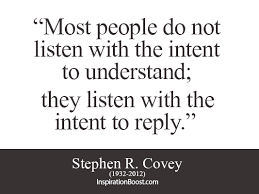“I had the same thing happen to me!”
“This is what I did…”
“I know exactly what you mean.”
“Let me tell you what…”
When it comes to ideas, experiences, and opinions, we often seem to know it all. We know the best contacts, we have experienced how tough that boss is, what it’s like to be involved in a departmental downsize, or how to stand out amongst peers.
More often than none, we find ourselves quickly judging the other’s perspective, too readily offering advice, talking over our peer/boss, or being a sentence grabber.
Here are 6 tips for active listening to improve yourself and your current or future employer:
- Face the speaker and maintain eye contact.
Give the speaker feedback, such as “yes” or nodding.
- Turn off the mind…well not all the way.
Our constant thinking can get in the way of listening to what is being said. Focus on what is being said.
An employer mentions the opportunity of a pay increase, while discussing additional perks of a new role. Instead of reveling in the idea of new money headed your way, shift back and refocus on the conversation, so that your mind is fully engaged in the entire opportunity. Avoid being a sentence grabber.
- Do not add to the speaker’s meaning.
This is not your best friend – there is no need to finish the speaker’s sentence. Allow the speaker to fully finish and express what is being discussed, even if it means waiting during a pause.
- Do not interrupt with your “solutions” or ideas.
There is a time for clarifying questions, and it happens to be at the end! Wait for the speaker to pause to ask any questions. Stick to the topic being discussed – no detours.
- From “I know!” to “I agree.”
Transitioning from the phrase “I know” to “I agree” gives the speaker the attention and control. It no longer implies “I have experienced this already. I have the upper hand”, but it suggests “We are in this together. We share this experience.”
- Restate what was said in simple terms.
Paraphrase the gist of what the speaker expressed, looking for nonverbal cues to confirm or deny the accuracy of your paraphrasing.
Fostering relationships based on mutual understanding is the key to our success and any company’s success. The intent with which you listen will convey an attitude of respect and interest– and ultimately this is our goal here at Emerald Resource Group.
Written by: Sierra Prinzbach, Intern and Listening Guru, Emerald Resource Group


